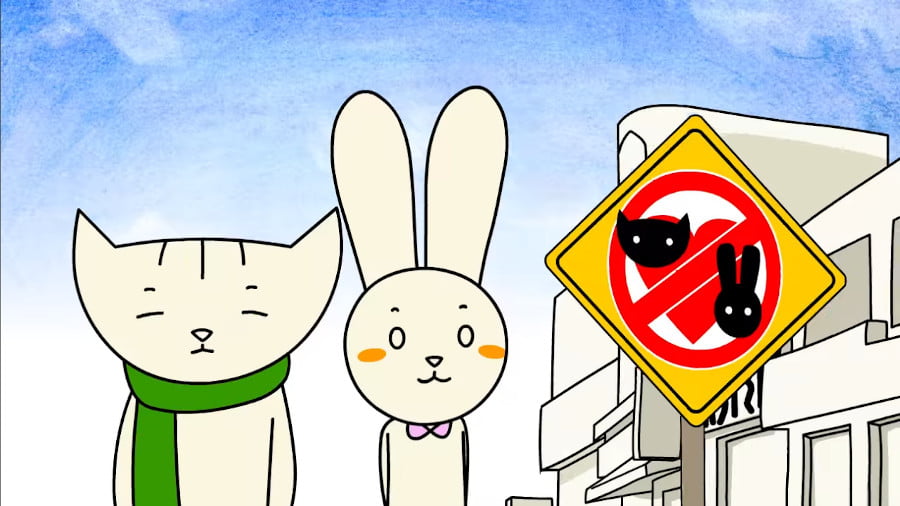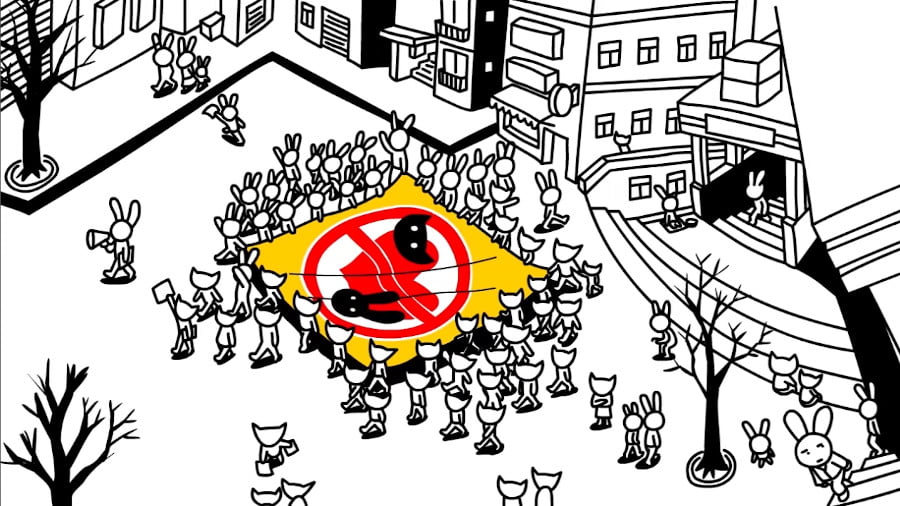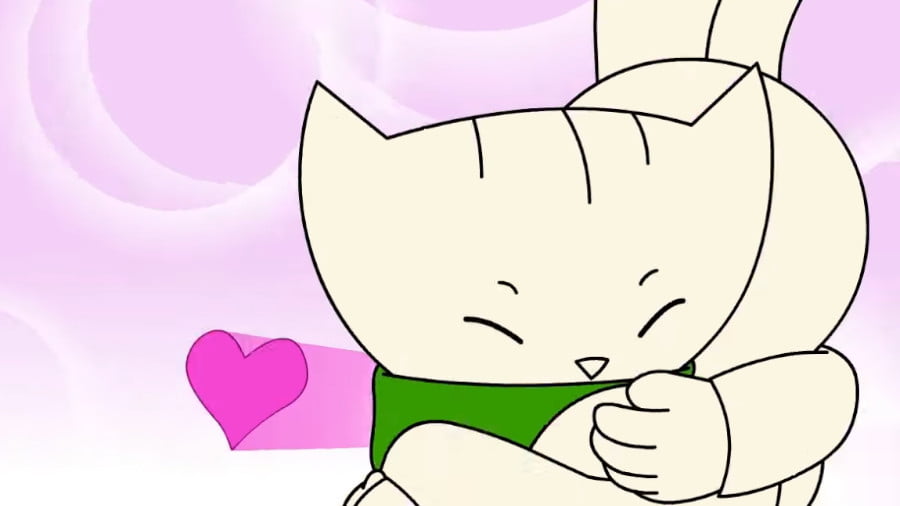In internet culture times, there’s a timelessness and an immateriality that comes from being classic.
If you were on the internet in your teenage years in around 2004, you probably know something about a particular genre of animation that tends to get called ‘Flash’ animation. And there’s a lot to be said about how Flash animation worked, and the gates it left wildly open. Sometimes people get caught up on the techniques and what they permitted, and lose track of the compression, and how turning a long animation into vectors and math meant it could be more easily translated into an internet transmissable format. That format led to hosting sites, and those hosting sites led to communities and those communities led to trends and distribution, and that is how you get things that people knew, that seemingly everyone had seen, but couldn’t attribute to any kind of source.
Even if the thing everyone’s seen has source inside it, ‘cos it’s written in a different language.
Content Warning: Racism and a pet death
That’s kind of how There She Is!!, a 2004 set of animations about a rabbit named Doki who crushes on a cat named Nabi from the South Korean team posting on SamBakZa got to be omnipresent and obvious in the minds of a very specific niche of Too On The Internet kids who are now all, uh, well, you should go to bed earlier and maybe get a chair that’s better for your back. There’s very little I can properly offer about the animation itself — I think it looks amazing, I think that there’s a lot of vibrance and detail to all the scenes, and I also think that I’m a dude who doesn’t know enough about animation to really provide meaningful commentary there.
I knew for a long time that this was ‘a thing from Korea’ but that was the limit of my awareness, and most people I knew went that far too. You watched the first bit, maybe the second bit and went ‘oh hey, wow, there were two parts to this’ and that was cool and impressive and then it bubbled along in the sea of content.
I also didn’t think there was more to it than ‘pretty animation about anime style couple with a pushy girl and a shy boy.’ I have one of the songs from this collection, the Bulldog Mansion song Happy Birthday To Me, which I still listen to on a yearly basis. I didn’t really think there was more to it, despite there being very clearly two parts I saw, and the second part ended on a cliffhanger. It wasn’t for years that I’d go back, and, realising that this thing was almost twenty years old, investigate it and see what I thought of it with the benefit of hindsight.
Turns out there’s a lot more to There She Is!! than I had appreciated when I watched those first two parts. Heck, there’s a kickstarter game project that seems to be dead, but then that’s not a surprise in the context of the internet culture of the 00s.

Anyway, uh, There She Is!! is about racism.
Most specifically it’s about the particular variety of racism not uncommon in South Korea about relationships between Japanese and Korean people, which you can nitpick that ‘hey, this isn’t quite about racism’ but look, it’s an oppression structure based entirely out of racism, don’t give me that look.
There’s a bunch of stuff that serves as hallmarks of being a 2004-era thing, like the way the phones look and the fact Nabi has a job delivering newspapers that appears to be, like, a job. There’s also a 2004ness to its depiction of relationships, especially in that particular model of anime-style pushy-girl cartoon-violence archetype. Doki is very cute, but cute in a Sanrio way, she’s not designed in a way that I think the audience is meant to relate to her as being hot. There’s a definitely deliberate cutesiness to the whole thing. Doki starts out being interested in Nabi and then the visual language of the story positions us as seeing things from Nabi’s perspective — she’s everywhere he goes, she expresses her interest in him, relentlessly, and she’s not interested in his rationale as to why she shouldn’t be.
“I like you.”
“You shouldn’t.”
“Why not.”
“Racism.”
“I don’t get it.”
But at the same time, she expresses her displeasure with over-the-top violence that’s clearly meant to be more ‘relentless’ than ‘actually terrifying,’ since one of the things she does is fill an elevator with seemingly otherwise-immaterial love hearts. This can get framed as ‘hey, this is about a stalker’ but it’s really obviously not — Nabi’s framed as being surprised and shocked by her presence when she appears, but also from his literal first interaction with her, his reaction is ‘but bunnies and cats don’t date,’ and he’s clearly running from that.
Don’t remember it?
Go back and rewatch it. Look at Nabi’s first reaction to her expressing interest; he looks to his surroundings, to see what do other people do. It’s what he’s running from. Nabi doesn’t want to do the thing you’re Not Supposed To Do. Doki’s whole ‘unreasonable’ nature is that she’s not willing to accept racism as a good reason to avoid her, and when he starts hanging out with her… he’s immediately smitten with how she tries things.
Oh my god, this whole thing rips. I like it so much, and I found the whole thing, collected at once, as a set of music videos telling the story they did, as being really sweet and sad and painful all in the same way. Like, this is a story about racism where characters get subjected to hate crimes, that’s something I wasn’t used to seeing in ‘serious’ media. They try to share time and show care for one another around the constraints of their society and even that’s not good enough, because when you’re dealing with a system like racism, it’s about keeping you in your place which is anywhere but here. It’s not being mean, it’s about the understanding you should know how the world works. A rock thrown through a window is meant to scare someone because they don’t know who threw it but they do know why it was thrown.

The oppression is everywhere, too. The restaurant in Cake Dance was happy to serve the party of cats and bunnies but the second Nabi and Doki showed affection for one another, they threw the whole party out. The jagged-outline bunnies are the kids of an interracial relationship (it’s why they have the fuzzy outlines), and they’re street toughs who do nothing but crime because it’s not like they have an alternative. When they see a cop, their only solution is how do we hurt them because they know full well that the system is designed to hurt them first. Nabi can’t get a moment of peace from it in a hospital room with Doki.
Nabi doesn’t give up because he’s weak, he gives up because the system is designed to crush him and his refusal to be crushed, in the end, is a remarkable show of strength when the reality is the system shouldn’t be there, it shouldn’t be allowed to treat them like this.
This oppression is so absolute, so overwhelming, that I found it drily miserable to see its mollifying, polite cousin in the Youtube comments. Why, this person is so happy that the animation portrays the racist protesters as just as bad as the anti-racist protesters. And another one. And another one again. And there it was, the comparison to recent anti-Asian hate, and how everyone needed to cool down, because it’s very important that you know that these systems are, you know, very bad, but also, it’s bad to try and change them.
Yeah, the story isn’t as as unequivocally on the side of anti-racism protesters as it could be, but it still pictures them as a very real force doing really good work, clashing with people who are trying to hurt people, and trying to stop them, and in the end, while they present challenges for this specific story, they’re still there to fight for a better world which is part of what Nabi and Doki commit to doing at the end.

You wanna know the moment that makes me tear up, though? Not the relationship, not the culmination of it, it’s this single moment. It’s so fucking dumb, but it makes so much sense to me. It’s this bit where Il-ho just eats shit off a motorcycle into an intersection.
He knows his gangmates (siblings?) can get Nabi there. He knows it’s going to hurt. He knows he can do this, and he knows it’s what he can do here. It’s the culmination of so many complicated feelings about being one of life’s secondary characters, from this wordless angry rabbit gangster, who gets treated like a monster by the people around him, who doesn’t know much but he does know how to hurt and how to handle being hurt. No hesitation, no doubt, this is what it’s gunna be and he just goes for it.
Il-ho’s great.
I like the airport scene too, but not because of the centrist bullshit stance people in the Youtube Comments are taking, about how it’s about both sides being bad. It’s because when confronted with that moment, with these big political forces, the yes and the no, Nabi isn’t making a choice based on those things. He’s not doing things because he’s been argued into it, he’s doing the right thing for right here, and that’s admitting what he wants. He wants Doki and he wants to stay and if that means tomorrow he’s making the world better for both of them, then that’s what he’s gunna do. Because all these systems get changed by people doing things to make the world better, by finding the people they can help and connecting them.

Fun tidbit: This whole thing started out as a comic in a braille newspaper!